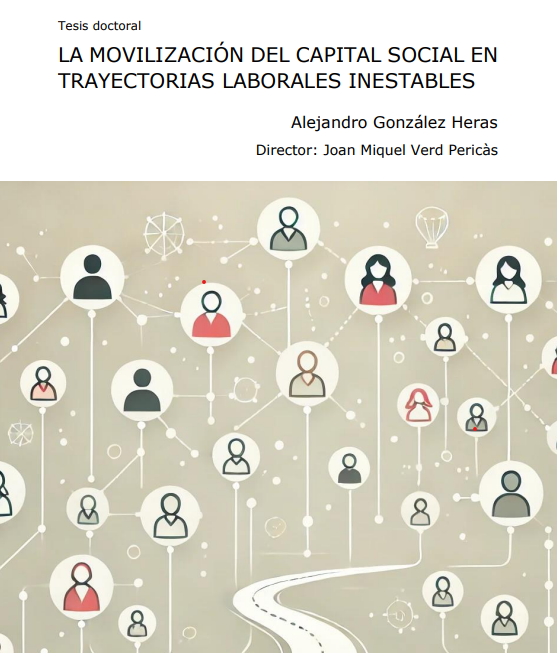Doctoral thesis defense of Alejandro González Heras
LA MOVILIZACIÓN DEL CAPITAL SOCIAL EN TRAYECTORIAS LABORALES INESTABLES

The doctoral thesis is part of the CAPSINES project (The accumulation and use of social capital in young people with unstable employment trajectories), a project concerned with the effects of inequalities in personal networks and the embedded resources on the employment opportunities of young people. From a methodological point of view, the CAPSINES project collects sequential retrospective information using the life history grid technique implemented within a hybrid survey context. Hence, 150 interviews (with an average duration of approximately 90 minutes) were conducted with young individuals (aged 30-34) in the Metropolitan Area of Barcelona. The doctoral thesis focuses on different types of social capital (bonding, bridging, and linking) and their relationship with employment access in the context of unstable labour market trajectories, approached through sequence analysis.
The thesis is structured as a collection of articles. The first article is theoretical in nature, discussing the differences between bonding, bridging, and linking social capital types. The second article reviews the quantitative indicators used in the literature to approach the types of social capital and then discusses the pertinence of the operationalisations used. The third article addresses the role of the relationship between status and tie strength in characterising the instrumental support obtained for employment access. It highlights the significant role played by hierarchical strong ties (or hierarchical bonding) in young people’s employment access, a possibility that has generally been overlooked in the literature. Finally, the fourth article proposes a mixed approach, combining sequence analysis and qualitative content analysis to examine to what extent the relationship between educational level and labour market trajectory is mediated by the use of social connections. Considering that educational level is the variable with the greatest influence on labour market trajectories, cases are classified based on whether they illustrate the relationship between educational level and trajectories. Specifically, it analyses whether discordant cases, i.e., those that do not follow the identified norm in the relationship between educational level and trajectories, are characterised by a particularly significant use of social connections in employment access.
Collectively, this compilation provides new perspectives on the use of social capital throughout young people’s labour market trajectories, particularly those experiencing unstable labour market trajectories. The results obtained are useful for the design and development of public policies aimed at reducing youth unemployment and job instability, as they emphasise the role of the social context of these young individuals, an aspect often overlooked in policy design.
Date: 18/09/2024, 10.30h
Sala de Graus
Facultat de Ciències Econòmiques